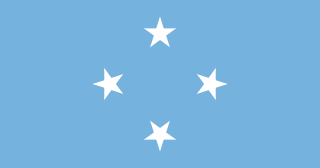
The Federated States of Micronesia, or simply Micronesia, is an island country in Micronesia, a subregion of Oceania. The federation consists of four states—from west to east, Yap, Chuuk, Pohnpei and Kosrae—that are spread across the western Pacific. Together, the states comprise around 607 islands that cover a longitudinal distance of almost 2,700 km (1,700 mi) just north of the equator. They lie northeast of Indonesia and Papua New Guinea, south of Guam and the Marianas, west of Nauru and the Marshall Islands, east of Palau and the Philippines, about 2,900 km (1,800 mi) north of eastern Australia, 3,400 km (2,100 mi) southeast of Japan, and some 4,000 km (2,485 mi) southwest of the main islands of the Hawaiian Islands.

The government of the Federated States of Micronesia (FSM) conducts its own foreign relations. Since independence in 1986, the FSM has established diplomatic relations with 92 countries, including all of its Pacific neighbors.

The Compacts of Free Association (COFA) are international agreements establishing and governing the relationships of free association between the United States and the three Pacific Island sovereign states of the Federated States of Micronesia (FSM), the Republic of the Marshall Islands (RMI), and the Republic of Palau. As a result, these countries are sometimes known as the Freely Associated States (FASs). All three agreements next expire in 2043.
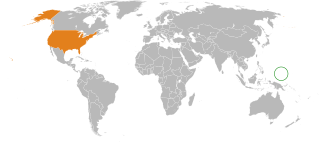
Federated States of Micronesia–United States relations are bilateral relations between the Federated States of Micronesia and the United States of America.
Micronesian Americans are Americans who are descended from people of the Federated States of Micronesia. According to the 2020 US Census, a total of 21,596 residents self-identified as having origins in the country, which consists of four states. More than half of these residents identified their origin as Chuuk State (12,464) with the rest as follows: 4,918 people from Pohnpei, 2,066 from Yap, and 2,148 people from Kosrae.

Visitors to Montenegro must obtain a visa from one of the Montenegrin diplomatic missions unless they are citizens of one of the visa-exempt countries. Visa policy is regulated by Regulation on Visa Regime Act. Where there are no diplomatic or consular representations of Montenegro, visa requiring foreigners may obtain them from diplomatic or consular representations of Serbia, Bulgaria and Croatia.

Visitors to Brazil must obtain a visa from one of the Brazilian diplomatic missions unless they are nationals of one of the visa-exempt countries or have the option to obtain an electronic visa. For stays longer than 90 days or for employment in Brazil, all foreign nationals must have a visa or residency authorization.
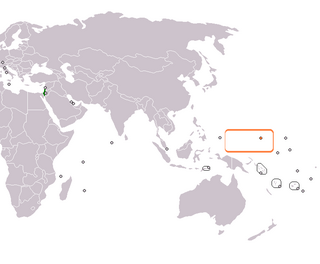
Israel – Micronesia relations are diplomatic and other relations between the State of Israel and the Federated States of Micronesia. Israel was among the first countries to establish formal diplomatic relations with Micronesia.

Visa requirements for Albanian citizens are administrative entry restrictions by the authorities of other nations placed on citizens of Albania.
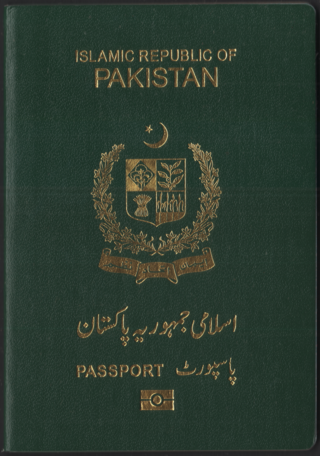
Visa requirements for Pakistani citizens are the requirements by other countries to obtain a visa before entry on an ordinary Pakistani Passport.

As of 2024, Hong Kong Special Administrative Region passport passport holders have visa-free or visa on arrival access to 172 countries and territories, ranking the passport 19th in the world according to the Henley Passport Index.
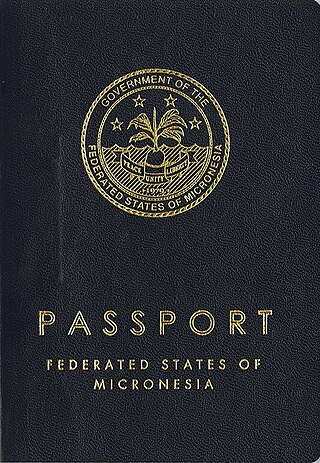
Visa requirements for Micronesian citizens are administrative entry restrictions by the authorities of other states placed on citizens of the Federated States of Micronesia. As of 2 July 2019, Micronesian citizens had visa-free or visa on arrival access to 119 countries and territories, ranking the Micronesian passport 49th in terms of travel freedom according to the Henley Passport Index.
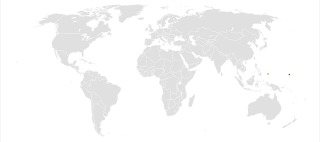
The Federated States of Micronesia and Palau share very good relations, as they are both bound by Compacts of Free Association with the United States. Palau decided not to join Micronesia when it became independent in 1986, due to language and other cultural differences. Palau became independent in 1994. Micronesian citizens may stay one year in Palau without a visa and a Palauan citizen may stay in Micronesia indefinitely without a visa. The two countries support each other as well as the United States and the Marshall Islands, another country in free association with the United States. The two countries also often support Israel, similar to the United States and the Marshall Islands.

The visa policy of Albania allows citizens of certain countries to enter Albania without a visa. Citizens of certain other countries must obtain a visa from one of the Albanian diplomatic missions. Alternatively, they may obtain an electronic visa.

Micronesian passports are the regular travel document issued by the Federated States of Micronesia to its citizens in order to enable them to travel outside the country.

All visitors arriving in the Federated States of Micronesia must have a valid passport or other travel document issued by the government of the country of citizenship or nationality. The document must be valid for at least 120 days beyond the date of entry. Exception to this rule are the citizens and nationals of the Federated States of Micronesia, Republic of Palau, the Republic of the Marshall Islands, or the United States who may also prove citizenship or nationality by birth certificate or entry permit. Their nationals are also issued an entry permit valid for up to a year. Other nationalities are allowed stay of 30 days that may be extended up to 60 days. Departure Tax applies.

The British Overseas Territories maintain their own entry requirements different from the visa policy of the United Kingdom. As a general rule, British citizens do not have automatic right of abode in these territories.
The nationality law of the Federated States of Micronesia determines who is or may become a citizen or national of the Federated States of Micronesia (FSM). Article III of the Constitution of the Federated States of Micronesia provides the basis for nationality law, while specific provisions are elaborated in 7 FSMC § 201 et seq.

Australia–Federated States of Micronesia relations are the bilateral relations between Australia and Federated States of Micronesia (FSM). Australia was the first country to start diplomatic relations with FSM in 1987 and is one of the four countries that have resident ambassadors to Micronesia. The two countries are members of the Pacific Islands Forum.

David W. Panuelo is a Micronesian politician who served as the president of the Federated States of Micronesia from 2019 to 2023.

















